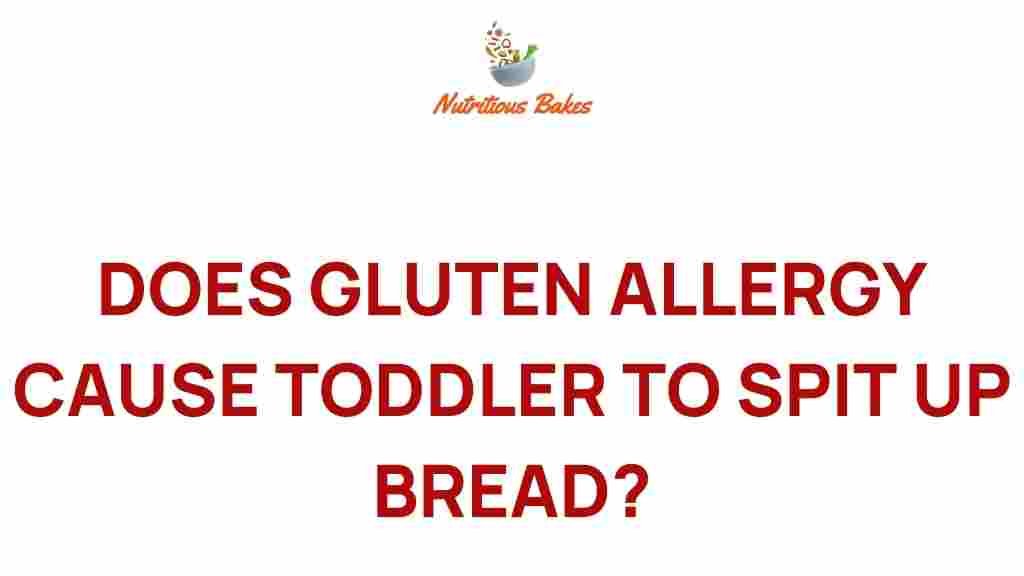Can Gluten Allergy Be the Culprit Behind Your Toddler’s Bread Spitting?
As a parent, witnessing your toddler’s reactions to food can be concerning, especially when it comes to something as common as bread. If you’ve noticed your little one spitting out their bread, it could potentially be due to a gluten allergy or other food sensitivities. In this article, we will explore the relationship between gluten allergy and toddler health, provide parenting tips, and discuss digestive issues related to bread sensitivity.
Understanding Gluten Allergy and Its Impact on Toddler Health
Gluten is a protein found in wheat, barley, and rye. For some individuals, particularly those with celiac disease or non-celiac gluten sensitivity, consuming gluten can lead to adverse health effects. A gluten allergy, though less common, can trigger strong immune responses. Understanding the signs and symptoms of gluten allergy is crucial for identifying potential food reactions in toddlers.
Signs of Gluten Allergy in Toddlers
Recognizing gluten allergy in toddlers can be challenging since they may not be able to articulate their discomfort. Here are some common signs to look out for:
- Digestive Issues: Complaints of stomach pain, bloating, diarrhea, or constipation.
- Behavioral Changes: Increased irritability or mood swings after eating gluten-containing foods.
- Skin Reactions: Rashes, eczema, or other skin irritations.
- Failure to Thrive: Difficulty gaining weight or growing at a normal rate.
Testing for Gluten Allergy
If you suspect that your toddler has a gluten allergy, it’s essential to consult a pediatrician. They may recommend the following tests:
- Blood Tests: To check for specific antibodies related to celiac disease.
- Skin Prick Tests: To identify allergic reactions to gluten.
- Food Diary: Keeping a record of what your child eats and any symptoms that arise.
Step-by-Step Approach to Managing Bread Sensitivity
If a gluten allergy or sensitivity is confirmed, here are steps to help manage your toddler’s diet:
1. Eliminate Gluten from Their Diet
Start by removing all gluten-containing foods from your toddler’s diet. This includes traditional bread, pasta, and baked goods. Instead, look for gluten-free alternatives such as:
- Rice-based products
- Quinoa
- Gluten-free bread made from alternative flours (like almond or coconut flour)
2. Read Labels Carefully
Many packaged foods contain gluten. Always check the ingredient list and look for labels that specifically state “gluten-free.” This practice is essential for ensuring your toddler’s safety.
3. Introduce Safe Foods Gradually
Once gluten is eliminated, reintroduce foods gradually to identify any other potential sensitivities. Monitor your toddler for any signs of food reactions.
4. Consult with a Nutritionist
If you’re struggling to provide a balanced diet without gluten, consider consulting a nutritionist who specializes in pediatric diets. They can provide valuable insights and meal plans that cater to your toddler’s needs.
Tips for Parents Dealing with Food Reactions
Handling food sensitivities in toddlers can be overwhelming. Here are some parenting tips that may help:
- Stay Calm: Your toddler will pick up on your emotions. Staying calm can help them feel secure.
- Keep a Routine: Maintain regular meal times and snacks to help your toddler adapt.
- Involve Your Toddler: Let them help in the kitchen to get them excited about gluten-free foods.
- Educate: Teach your child about their dietary restrictions in an age-appropriate way.
Troubleshooting Common Issues with Gluten-Free Diets
Even after eliminating gluten, your toddler may still experience digestive issues. Here are common problems and how to address them:
1. Constipation
Switching to a gluten-free diet can sometimes lead to constipation, especially if fiber intake decreases. Ensure your toddler consumes plenty of fruits, vegetables, and other high-fiber foods.
2. Nutritional Deficiencies
Gluten-free diets can sometimes lack essential nutrients. To prevent this, focus on a variety of whole foods, including:
- Fruits and Vegetables
- Lean Proteins
- Dairy or Dairy Alternatives
- Healthy Fats
3. Social Situations
Eating out or attending birthday parties can be challenging. Communicate with hosts about your child’s dietary restrictions and pack safe snacks when necessary.
When to Seek Pediatric Advice
If your toddler continues to exhibit symptoms or if you’re unsure about how to manage their diet, it’s vital to seek pediatric advice. Regular check-ups can help monitor their growth and nutritional status.
For more detailed information on managing food sensitivities, consider visiting this resource.
Conclusion
Understanding the potential impact of gluten allergies on your toddler’s health is crucial for providing a safe and nurturing environment. If you’ve noticed your child spitting out bread or showing signs of food reactions, it may be time to investigate the possibility of gluten allergy or sensitivity. By following the steps outlined in this article, you can take proactive measures to ensure your toddler’s diet is both safe and nutritious.
Remember, you’re not alone in this journey. Many parents face similar challenges, and support is available. Stay informed, consult with healthcare providers, and trust your instincts as you navigate your toddler’s dietary needs.
This article is in the category Tips and created by NutritiousBakes Team
